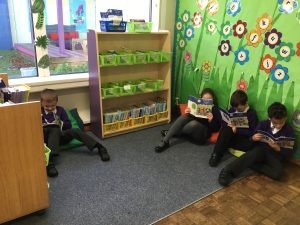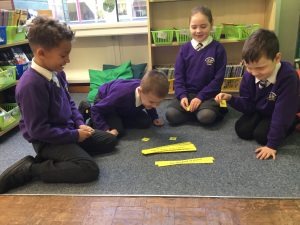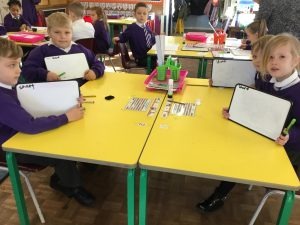English
Reading
We want our children to become enthusiastic and engaged readers, and to develop a life-long love of books. We introduce the children to a range of good quality fiction, non-fiction and poetry books through our whole-class, core-text approach to teaching reading, and during their weekly guided reading session.
In the early stages of reading, we teach children to decode words using phonic skills as their main approach, alongside which we teach sight vocabulary. Once grasped, the focus for developing reading is understanding and comprehension. Your child will read with their class teacher once a week during their guided reading session, then independently supported by teacher set activities during the rest of the week.
Home Reading and Reading for Pleasure
Developing readers will bring home levelled books and a picture book each week. Independent readers will bring home self-selected books from their book corner. Please spend time reading with and talking to your child about what they read, and help them to use their reading log to record their enjoyment of reading. Pupils can earn bookmarks for using their reading logs effectively.
Phonics
For the teaching of Phonics (and Spelling in Key Stage Two), we follow the Sounds Write Programme. This systematic programme teaches children the skills needed to read and write successfully through well structured lessons. Children in Reception and Key Stage One have daily phonics lessons of 20 minutes, and our Key Stage Two children use Sounds Write as a spelling programme in daily 10-minute sessions.
We ensure that all our Key Stage One children have both a phonetically decodable book which supports their phonics learning in class and is matched to their own phonics level as well as a colour banded book which encourage a love of reading and are chosen by the children themselves. Furthermore, children have access to a range of stimulating resources for additional phonics practice.
We provide Phonics Workshops for our parents and carers to help explain how phonics is taught. The National Phonics Screening Check takes place in Summer Term for Year 1 pupils.
Spelling
Alongside phonics, we also teach the children how to spell from Year 1 onwards. We believe that learning to spell is an important tool for your child to use as an essential part of day-to-day life, as well as in their learning. We teach spelling using an investigative and collaborative approach, focusing on spelling patterns, prefixes and suffixes, knowledge of word origin and root words. At the end of Year Two, children will have a spelling test and also at the end of Year Six.
Writing
We use a core text approach over a half term to plan quality written outcomes. This high quality literature is used to engage and inspire the pupils, and provide rich models of writing for them to imitate in their own independent writing, through style, voice and language structure.
The beginning of the half term is spent on the first stage of the writing process – inspire, immerse and analyse, with the remainder of the term spent on planning, quality written outcomes, editing then publishing. A week is devoted to producing the final written outcome as the children are not expected to produce a whole written outcome in one lesson, but rather build up to it over time. Children use cursive handwriting to publish their learning.
Grammar and Punctuation
Grammar and punctuation are taught during English sessions through contextualised learning linked to the core-text. Grammar, language and punctuation skills are taught through analysis of the author’s use of effective vocabulary choices, language structures and writing style, and by using the core-text as a model during the writing process. Children are given opportunities to imitate the author’s style, reflect on why the writing is effective, then to practise and develop their own writing style using the skills they have learnt.
Handwriting
Continuous cursive script is taught from Year 1 onwards through daily handwriting sessions. In Nursery and Reception, pre-cursive script is taught. All handwriting sessions are planned for, modelled and taught following the: I do, we do, you do sequence. Attention is drawn to capitalisation and spelling during the session, as well as to the correct starting point, letter formation and join.


